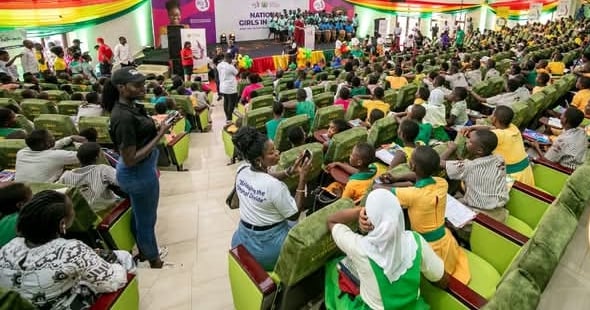The Ministry of Communication, Digital Innovations, in partnership with the Kofi Annan Centre of Excellence in ICT (KACE) and the Ghana Investment Fund for Electronic Communications (GIFEC), orchestrated a significant mentorship program for 1,000 girls from basic schools across the 18 districts of the Volta Region. This initiative, preceding the culmination of a three-week training program, aimed to empower and equip these young girls with the skills and confidence to thrive in the Information and Communication Technology (ICT) sector, fostering gender parity in a traditionally male-dominated field. The program, aptly themed “Girls in ICT for Inclusive Digital Transformation,” showcased the unwavering commitment of the Ministry and its partners to bridge the gender gap in ICT and STEM fields, aligning with the global call for digital inclusion championed by institutions like the International Telecommunications Union (ITU).
The core objective of this mentorship program was to inspire and motivate these young girls to envision careers in ICT and STEM. The program brought together a diverse array of accomplished female ICT professionals, spanning industry leaders, academicians, and educators. These mentors shared their personal journeys, successes, and challenges, providing real-world insights into the opportunities and possibilities within the ICT landscape. This direct interaction with role models allowed the girls to gain firsthand knowledge and inspiration, breaking down stereotypes and fostering a sense of belonging in the tech world. The mentorship program also provided a platform for the girls to ask questions, network, and build connections with successful women in the field, planting the seeds for future mentorship and guidance.
A key aspect of the program’s success lay in its inclusivity. The organizers ensured that the program catered to all participants, including those with disabilities, ensuring that the benefits of the ICT training reached every girl. This focus on accessibility reflects the Ministry’s commitment to leaving no one behind in the digital transformation journey. The Ministry provided tailored support and resources to ensure that girls with disabilities could fully participate and benefit from the training, emphasizing the importance of equitable access to education and opportunities for all. This inclusive approach underscores the belief that diverse perspectives are essential for innovation and growth in the ICT sector.
Beyond the direct impact on the girls, the program also extended its reach to include approximately 100 teachers. The Ministry recognized the crucial role of educators in nurturing and supporting the girls’ continued development in ICT. By equipping teachers with the necessary skills and knowledge, the program aimed to create a sustainable ecosystem of support for the girls, ensuring their continued growth and progress in the field. This training empowered teachers to act as mentors and guides, fostering a supportive learning environment within their respective schools and communities.
The Ministry emphasized the importance of continuous monitoring and support for the girls to ensure the long-term success of the program. This commitment to sustained engagement highlights the understanding that a one-time intervention is insufficient to achieve lasting change. Ongoing mentorship, guidance, and support are crucial to fostering sustained interest and promoting the continued development of these young girls in their chosen ICT paths. This long-term vision emphasizes the importance of building a robust pipeline of female talent in the ICT sector, driving innovation and progress for years to come.
The “Girls in ICT” program is not an isolated event but rather a significant component of the Ministry’s annual commitment to promoting gender equality in the ICT sector. Every year, the Ministry trains 3,000 girls and 300 teachers across three regions, demonstrating a sustained dedication to fostering digital inclusion and empowering young women in technology. The demonstrable impact of the program is evident in the increased enthusiasm, confidence, and aspirations of the participating girls. By equipping them with the necessary skills, providing access to inspiring mentors, and fostering a supportive ecosystem, the program not only empowers individual girls but also contributes to a broader societal transformation, paving the way for a more inclusive and equitable digital future for Ghana. This commitment to long-term investment in the future of young women in ICT underscores the Ministry’s recognition of the transformative power of technology and its potential to drive economic growth and social development.


